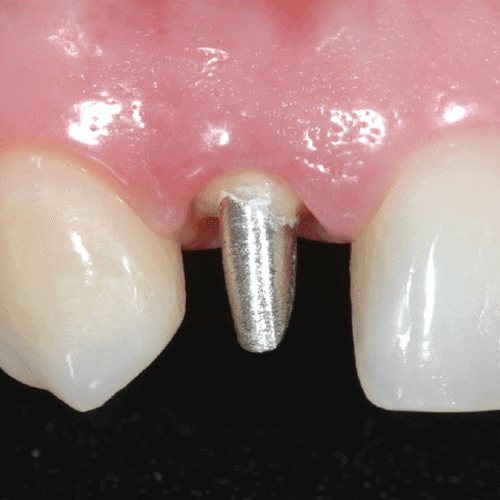What Are Posts and Cast Posts?
A post is a small metal shaft that is implanted into the root of the tooth. A post is placed inside the root of a tooth to help stabilise the tooth and make it a more secure structure, this is generally done so that a crown or other kind of prosthetic can be placed on the structure. This treatment can only be done to a tooth that has had root canal treatment.
A cast post is similar to a post however the small metal shaft is not implanted into the root of the tooth. The post is instead made attached to a crown that is to be placed on the tooth and when the crown is cemented to the tooth the metal shaft then sits in the root of the tooth. Once again this can only be done when a tooth has been root treated.
Our dentist will let you know where a post or cast post is necessary.

What Are The Benefits Of Posts and Cast Posts?
The benefits of using posts and cast posts in dentistry are that they provide additional support and stability for dental restorations such as crowns, bridges, and dentures. By placing a post inside the root canal of a tooth, the restoration can be securely attached to the remaining tooth structure, which can help to improve the longevity and function of the restoration.
Additionally, cast posts can be custom-fitted to the shape of the root canal, providing a strong foundation for the restoration and helping to distribute the chewing forces evenly across the tooth. This can help to prevent further damage to the tooth and surrounding structures, and can also improve the patient’s ability to chew and speak comfortably.
However, it’s important to note that the use of posts and cast posts is not always necessary or appropriate for every dental situation, and the decision to use them should be made on a case-by-case basis by our experienced dentists. If you have any concerns it’s important to discuss these with our dentists before undergoing any dental treatment.
what are the alternative option for posts or cast posts?
In some cases, a post or cast post may not be the best option for supporting a dental restoration. In these situations, there are alternative options that can be considered. Some of these alternatives include:
Bonded restorations: In some cases, a bonded restoration may be a suitable alternative to a post or cast post. This involves bonding a restoration directly to the remaining tooth structure, without the need for a post.
Implants: Dental implants are a popular alternative to traditional dental restorations. An implant is a small, titanium post that is surgically placed into the jawbone, where it fuses with the bone to provide a stable foundation for dental restoration.
Removable dentures: For patients who are missing multiple teeth, a removable denture may be a suitable alternative to a fixed dental restoration. Removable dentures can be easily removed for cleaning and maintenance and can be designed to fit comfortably and securely in the mouth.
Conservative restoration: If a tooth has only minor damage or decay, a conservative restoration such as a filling or inlay may be sufficient to restore the tooth’s function and appearance without the need for a post or cast post.
It’s important to discuss all available treatment options with our dentist in Wide Bay Central Dental Clinic to determine the best course of action for your individual needs and goals.


FAQs
Here are common frequently asked questions (FAQ) about posts and cast posts in dentistry:
1 – What are the differences between posts and cast posts?
- Posts are small, cylindrical or conical rods that are placed inside the root canal of a tooth to provide additional support for a dental restoration. Cast posts, on the other hand, are typically made of metal alloys and are custom-fitted to the shape of the root canal, providing a strong foundation for dental restoration.
2 – When is a post or cast post needed?
- A post or cast post is typically needed when a tooth has lost a significant amount of its structure due to decay, trauma, or other factors, and needs additional support to hold a dental restoration in place. The decision to use a post or cast post is made on a case-by-case basis by a dentist, based on the individual needs of the patient and the condition of the tooth.
3 – How are posts and cast posts placed?
- The placement of a post or cast post typically involves removing any remaining decay or damaged tooth structure, preparing the root canal to receive the post, and cementing the post in place. A cast post is typically custom-fitted to the shape of the root canal, while a prefabricated post may require some modification to fit properly.
4 – What are the potential risks and complications of using a post or cast post?
- The use of a post or cast post can sometimes weaken the remaining tooth structure or cause the tooth to fracture, especially if the post is too large or the tooth is already weakened. Additionally, if the post or cast post is not properly placed or fitted, it can cause damage to the root canal or surrounding tissue. It’s important to discuss the potential risks and benefits of using a post or cast post with your dentist before undergoing any dental treatment.
5 – What is the typical cost range for a post or cast post in dentistry?
- The cost of a post or cast post in dentistry can vary depending on a number of factors, including the location of the dental practice, the experience and training of the dentist, the materials used to fabricate the post, and the complexity of the dental procedure. Patients should discuss the cost of any dental procedure with our dentist and check with their insurance provider to determine what costs may be covered.
